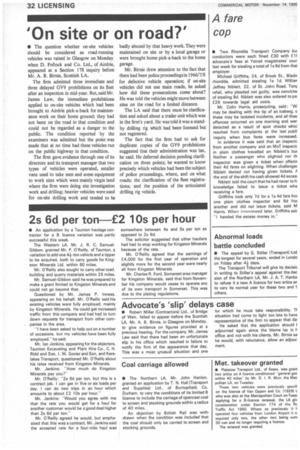' On site or on road?'
Page 34

If you've noticed an error in this article please click here to report it so we can fix it.
• The question whether on-site vehicles should be considered as road-running vehicles was raised in Glasgow on Monday when D. Pollock and Co. Ltd., of Airdrie, appeared at a Section 178 inquiry before Mr. A. B. Birnie, Scottish LA.
The firm admitted three immediate and three delayed GV9 prohibitions on its fleet after an inspection in mid-year. But, said Mr. James Law, the immediate prohibitions applied to on-site vehicles which had been brought to Airdrie pick-a-back for maintenance work on their home ground; they had not been on the road in that condition and could not be regarded as a danger to the public. The condition reported by the examiners was admitted but the point was made that at no time had these vehicles run on the public highway in that condition.
The firm gave evidence through one of its directors and its transport manager that two types of vehicles were operated, smaller vans used to take men and some equipment to work sites which were mainly virgin land where the firm were doing site investigation work and drilling; heavier vehicles were used for on-site drilling work and tended to be badly abused by that heavy work. They were maintained on site or by a local garage or were brought home pick-a-back to the home garage.
Mr. Birnie drew attention to the fact that there had been police proceedings in 1966/7/8 for defective vehicle operation; if on-site vehicles did not use main roads, he asked how did these prosecutions come about? He was told the vehicles might move between sites on the road for a limited distance.
The LA said that there must be clarification and asked about a trailer unit which was in the firm's yard. He was told it was a standby drilling rig which had been licensed but not registered.
The fact that the firm had to ask for duplicate copies of the GV9 prohibitions suggested that their administration was lax, he said. He deferred decision pending clarification on three points; he wanted to know precisely which vehicles had been the subject of police proceedings, where, and on what roads; the clarification of the fleet registrations; and the position of the articulated drilling rig vehicle.




















































































































